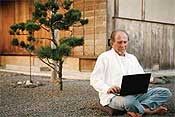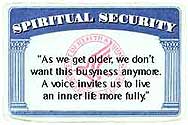Are you contributing to your spiritual security?
As the U.S. population ages, seniors work to cultivate a sense of value that flows from a renewed spiritual life.

IMAGINE A PARISH HALL MEETING OF ELDERS WITH ANNA, Simeon, Abraham, and Sarah. They sit in creaking folding chairs. Their white hair crinkles around lined faces. Some are almost blind. They are just four among many in the Bible who did powerful things in their later years: gave birth to a people, proclaimed the presence of the infant Christ among us.
What would these biblical seniors say as we look in the mirror and worry about the crow's-feet around our eyes? They might wonder at our comforts, Medicare, and medications. They might also wonder that we don't seem to know what our age is for.
As more people than ever turn 50, they are living "bonus" years into retirement. But many elders struggle with what is happening to them. They often feel exiled from the mainstream of life, despite perfecting their golf swings or driving to the Grand Tetons in Winnebagos.
"The message [of our culture] is to stay young as long as possible, dress and feel young, be fit," says Sister Sarah Doser, F.S.E., a nursing home administrator. A woman who has been fascinated with elders all her life, she has prayerfully considered the process of aging. She observes that in this culture, "to be old is what you don't want."
Pope John Paul II, perhaps moved by his own experience, said in his 1999 Letter to the Elderly, "Older people themselves are led to wonder whether their lives are still worthwhile."
How do elders fight invisibility and combat a sense of uselessness? Do those over 65 have to volunteer their lives away to feel a part of society? Where are the riches of age that our biblical ancestors seem to have valued?
"Old age is different now," said Sister Mary Timothy Prokes, F.S.E., a theologian, in a speech to those gathered to consider aging and spirituality at a conference at Mercy Retreat Center in Burlingame, California last year. "We have a whole new segment of life that is a gift in our culture," she told the group. "We are going to be responsible for that; it's not just to play golf. There's something there that needs support, understanding, and reflection."
The two Franciscan sisters address the problem directly by giving workshops around the country with the message that old age actually has a purpose; it's not just a period of loss and change.
Communities may be realizing that, as Pope John Paul goes on to say, "to exclude the elderly is in a sense to deny the past, in which the present is firmly rooted." But it takes a long time for a young culture that has moved thousands of miles away from its grandparents to realize the void.
Seniors don't have to wait for communities to regard them as more than a population that needs services. Elders—whether 50 or 90—can begin to cultivate a sense of value that flows from a renewed spiritual life, a practiced connection to God, and an attentiveness to the need for an interior life.
"You find you are hungry for, relentlessly driven toward wholeness," Doser says. "As we get older we find that being so busy professionally was fine, but it is no longer where life is. We wake up and say we don't want this busyness anymore. A voice invites us to live an inner life more fully."
Looking at the past
This passion for wholeness is not just a Christian concern. As he approached 60, Rabbi Zalman Schacter-Shalomi realized that the prospect of "extra years" was not exciting. After a 40-day retreat, consultation with wise friends, and much soul searching, he concluded that he and other elders needed to learn "life completion."
He created ecumenical "From Age-ing to Sage-ing" programs that help older people to get their spiritual juices flowing. The programs teach a positive approach to old age and give "skills for working on the inside: journal work, meditation, imaginal exercises, and spiritual intimacy." Zalman feels that in order to complete their lives, people need to spend time actively looking at their past, becoming aware of their inner voice, and sharing their faith with others.
The courses attract people who are thoughtfully looking at the last half of their lives, people that Sage-ing Center director Alison Issen calls "intentional boomers, those who are thinking about retirement."
The Sage-ing Center in Winter Park, Florida offers "Conscious Living/Conscious Dying," "Sacred Journey: Exploring the Creative Path to our Spiritual Center," and the practical "Groovy Grandparents," all in small-group settings. With this support, people feel comfortable exploring an interior life that they may have neglected.
Mary Kirkland, who left teaching at 55, finds that the courses have given her a dynamic new perspective. Brought up Catholic, she drifted away from the church as a young adult. While she taught English to students from grades six to college, her life was consumed by her work. With retirement she found the Sage-ing Center techniques were what she needed to reconnect with herself.
"They helped put the past in its place," she says. "I have especially liked 'Spiritual Growth, Spiritual Journey.' Now I'm reading the New Testament on my own. I find with retirement there is so much more time for the journey."
Mercy Center in Burlingame also offers programs for seniors and other interested Catholics. "What are we doing to form elders in the values of the second half of life?" asks Sandi Peters, a social worker and program administrator at Mercy Center. "If I walk into a Christian home and the people say to me, 'Don't get old!' their religion has failed them. They have to be educated that this time in life has a purpose. They have a responsibility to become elders for the community."
To assist this process Peters has led Sunday afternoon salons for seniors to openly discuss practical problems and share their faith life.
One active member of the group, "Alice" (not her real name), 70, says, "Spirituality becomes more important as I get older. In college I was in the Newman Club and other religious activities and cared about linking religion and social action. When I worked full time, I couldn't find groups or didn't have the time, but I kept up being a faithful Catholic.
"At 50," she says, "I decided I needed to exercise and eat right because I didn't want to turn into a little old lady who can barely walk across the street. I realized that I ought to be spending a similar effort on my spiritual well-being. I started going to retreats, read more, prayed a little more. Since I've retired, I've been able to do more."
One of the most exciting insights Alice discovered is this: We need very little more than regular time and quiet for spiritual vitality.

Practice makes perfect
An active senior who believes in using everything she has—body, mind, and soul—for as long as possible, Marie Roberts began to discipline herself to spend time in reading and meditative prayer about 20 years ago. "My best times are when I'm doing a regular practice every morning for 20 minutes or so," she says. "It's just an opening and brings me a sense of not being alone. You see yourself as being a part of everything."
Roberts, a member of Our Lady of Angels Parish in Burlingame, California, has seen this practice influence her life with her husband and her boys, now grown. "If you have a problem with your kids, it gives you a sense of acceptance. This practice gives you strength and helps you be more open."
Brought up Catholic, Roberts feels her regular spiritual practice helped her accept her sons' happy marriages, one to a Jewish woman and another to a woman from Bangladesh—relationships she might have resisted. With the support of her faith practice, she also could see her brother's death last year after a long illness as his reconciliation with God.
Peggy Kingman, 69, mother of seven and a ranch wife near Hollister, California, practices placing herself before God daily and has found her faith nourished. When her oldest son was diagnosed with a brain tumor four years ago, her practice made a dramatic difference.
"I thought my faith was strong, but I got to the point where I couldn't pray," King-man says. "I felt totally empty, but one thing I kept hanging on to was putting myself before God. After some months came strength, confidence, and joy that I hadn't had."
"Although he recovered, I never asked for healing; I asked to follow and accept whatever God had in store for us. I don't believe it's all about surviving the crisis," she says. "I believe the crises take you deeper; it doesn't seem to come any other way."
From doing to being
A major barrier to taking time for stillness is a resistance to simply being, not doing. When we have had such joy in accomplishing, feeling the wind whistle through our hair as we multitask, how can we feel satisfaction with less?
Looking at other cultures can provide some insight into what we lack. Leia Rosales, pastoral care coordinator for the retired Sisters of Mercy in Burlingame, grew up in the Philippines, a culture where the elderly are wisdom figures. They no longer have to accomplish. "We depend on them; they have value," she says. "They know how to be and how to pass on that beingness."
Rosales has found that in North American culture, even for religious sisters, the transition from an energetic life of doing ministry to "being" is painful. Retirement can wrench our sense of identity out of its socket. Who are we if we are no longer the expert reading teacher, the family law lawyer, the surgical nurse?
The biblical seniors might point out that a lack of joy in being might come from lack of practice in spending time alone with God.
There are many fine resources to help. Clinical gerontologist Jane Marie Thibault has written A Deepening Love Affair: The Gift of God in Later Life (Upper Room Books), a manual for finding the presence of God in everyday life using senses, memory, and imagination.
She talks about ways to expect that God will work over time. She urges seniors to talk to God, even badger God with questions, requests, and comments, and then to open themselves to the sense of God's presence.
"I have come to believe that the development of an intense, mutual love relationship with God is the primary spiritual task of later life," Thibault writes. In what she calls the "radical freedom of age," we all need "to try to approach the God who exists both within and without."
She coaches elders in spiritual growth, using step-by-step ways to increase awareness of God's presence in what she calls the "natural monastery of age." She knows the monastery is often not one of our own choosing, but it is up to us to take advantage of its losses and its strengths.
A gentle push
In this "drive toward wholeness" some elders may find they need more guidance and a gentle push now and then. Spiritual direction, once reserved for clergy and religious, can prompt them toward a regular and individual prayer practice. Both Catholic and Protestant laypeople are finding that meeting with a trained spiritual guide can be a prized opportunity to talk about God in their lives.
Peggy Kingman, who says she thinks frequently about getting older, sought out a spiritual director a year ago because she felt she wanted to "go deeper." Her director has helped her "to see God throughout the day," Kingman says. "Maybe he doesn't answer prayer during prayer, but he is present throughout the day. When I remember this, I'm more awake. It's fun because the day is full of surprises."
But, in fact, many of Kingman's generation and older do not seek out a spiritual companion. Those who provide pastoral care to people over 70 report that this generation is uncomfortable talking about their needs with anyone. They made it through the Depression and a number of wars by self-reliance. They did not grow up with counseling as a natural part of life. They often feel that spiritual direction or talking to anyone about their fears and questions about God should not be necessary.
One alternative is group spiritual direction under the guidance of a trained leader. Mitty Hambleton moved from California to Vermont a year ago. She provides spiritual direction to a growing and enthusiastic group in a parish near Burlington.
She says, "The elderly of the last generation were in the church when it was so rigid. Vatican II opened new vistas, but some people used to the rigidity were afraid to delve into new things. As they get older they seem to have a hunger for a 'new God.' When a person helps them connect with this 'new God' there is warmth; it feels so much better to them."
When she discovered that some of the group members she directs were just beginning to develop spiritually, Hambleton suggested ways to get started in personal prayer. "I suggest 10 minutes a day of prayer at first. They have a new awareness of the necessity for an inner life."
The rewards of attentiveness to dialogue with God are many. For example, attitudes toward death can be radically changed. "I don't know how people face death who don't have faith," says Kingman. "I'm looking forward to being united with God and meeting Jesus. I believe the promises and joy that will be. My faith is evolving. As I grow, the church is simply a finger pointing to the moon. My faith gives me great comfort and an anticipation of what the future may be."
Anna, Abraham, and friends sitting on those folding chairs came from a culture with no golf courses, but they lived lives suffused with a sense of purpose and community. Today, old age is a new and even trickier kind of opportunity than adolescence or parenthood. It depends on staying connected in new ways, doing less instead of more, listening, and on becoming a person of prayer in a society that profoundly lacks patience, time, and a faith perspective.
Elizabeth Dossa is a freelance writer living in Hillsborough, California. This article appeared in the September 2002 (Volume 67, Number 9) issue of U.S. Catholic.
